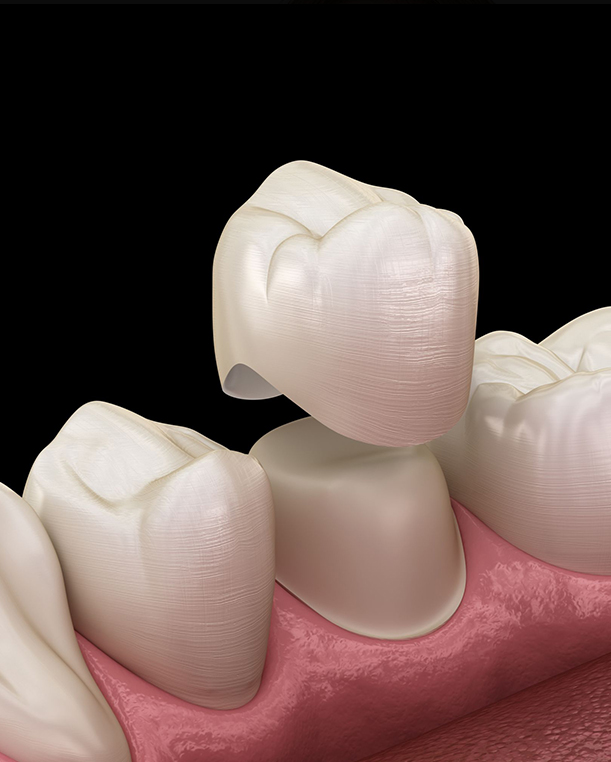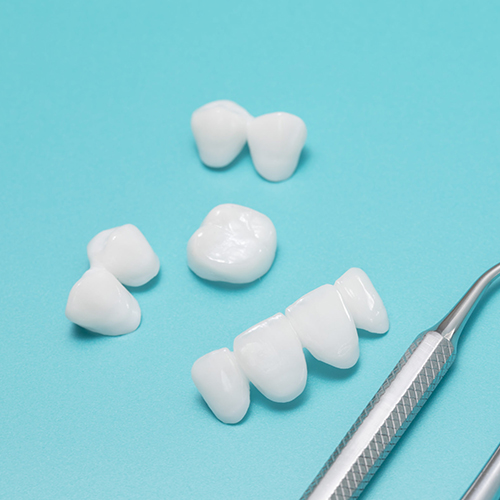- Home
- About Us
- Our Service
- Post-Operative Instructions
- Facilities
- Gallery
- Testimonials
- Blog
- Contact Us

- Home
- About Us
- Our Service
- Post-Operative Instructions
- Facilities
- Gallery
- Testimonials
- Blog
- Contact Us

Dental crowns are defined as hollow false teeth primarily used to strengthen impaired teeth. Dental crowns, also known as dental caps, are used for versatile restorative purposes in terms of both cosmetic and structural issues. Whether a tooth is structurally compromised due to traumatic injuries or weakened due to cavities, dental crowns help rebuild the structure, shape and rejuvenate the tooth’s functionality.
A tooth crown is recommended in many circumstances, as follows:
Dentists offer six types of dental crowns classified with respect to the materials used for fabrication. Please take a look at them.
| Type of dental crowns | Features | Pros | Cons |
|---|---|---|---|
| Porcelain Dental Crowns | Prepared using porcelains and ceramics | Most aesthetically pleasing type of dental crown | Highly susceptible to chipping easily (i.e.) less durability |
| Zirconia Crowns | Prepared using zirconium oxide |
|
The opposing tooth might wear down due to zirconia’s toughness. |
| Porcelain-Fused to Metal Dental Crowns | Prepared by fusing porcelain to metal crowns |
|
The metal parts provide a greyish line around the gums, making the tooth quite unaesthetic. |
| Gold Alloys Dental Crowns | Prepared using the combination of gold, copper, chromium or nickel |
|
Have chances of causing allergic reactions |
| Base Metal Alloys Dental Crowns | Fabricated using austenitic stainless steel |
|
Does not look natural |
| All-Resin Dental Crowns | Prepared using composite resins |
|
|
Dentists prepare a tooth with small-scale enamel removal, leaving the tooth’s stronger inner core. The portion of enamel removed is directly proportional to the thickness of the fabricated dental cap. It ensures the crown can fit efficiently over the shaped tooth.
No. You will not sense any pain during the crown treatment process. There will be no pain, thanks to local anaesthesia, whether it is preparing the tooth or mounting the appliance on it.
If the impaired tooth has mishaps in its outer layer alone and does not require preparations in nerves, then anaesthesia is not required.

No. The teeth crowns are not noticeable since the ceramic compounds like zirconia, porcelain are closer to the natural teeth colour. However, the crowns are obvious if you want gold or metal caps for teeth.
Moreover, dental doctors and laboratory technicians do everything to ensure the crowns provide the best possible match with the teeth.
A crowned tooth does not cause discomfort until the cemented cap becomes old. When the crown ages, it becomes inefficient and causes mild discomforts as listed below:
In such cases, the fixed crown must be removed, and a new one must be installed in its place.
Since the dental crown treatment is a non-surgical procedure, you will not encounter any discomfort once the treatment is completed. So you can get back to your routine work immediately after the crown treatment.
The crowned teeth do not mandate special attention, but you should take care of them as well as your natural teeth. We recommend continuing good oral hygiene habits and getting bi-annual dental check-ups are vital after dental crowns.
The Dental crowns are durable but are not indestructible.
Even though the dental caps resist bacteria invasion, the underlying tooth and surrounding tissues can. If you do not clean the crowned tooth properly, bacteria attacks will happen at the base where the natural tooth and crown meet. It will increase the risk of developing cavities in the underlying natural tooth structure.
Veneers are laminates made up of ceramic, porcelain, composite bonding materials. They ate very thin like a…
Straighten your teeth safely and exceptionally Orthodontic treatment deals with correcting teeth and jaw alignment by putting…
What is the meaning of maxillofacial? Maxillofacial means jaws and face, which combines with mouth becomes the…
What is cosmetic dentistry? Cosmetic dentistry, also known as Aesthetic dentistry, aims to elevate teeth appearance without…
Teeth Whitening is the most widely performed cosmetic dental procedure, as it lightens a tooth's natural color…
What is a smile makeover? Smile makeover is a part of cosmetic dentistry and varies from person…
Transform your disfigured tooth to its actual structure rapidly Dental crowns are defined as hollow false teeth…
Zenith Dentistry - Exquisite dental implants center in Sri Lanka Dental implants are small titanium screws inserted…
What are dental bridges & when are they used? Dental bridges are used in case of a…
What are dentures? Dentures are constructed by the dentist to replace the missing teeth. They are also…
What is teeth scaling and why is it required? Scaling is a treatment which cleans teeth by…
Virtually painless With Unmatched Precision Root Canal refers to a tooth's hollowed-out cavity where the pulp chamber…
What is laser dentistry? Laser dentistry is an effective and precise way of performing various dental procedures…
Pediatric dentistry (or) Kids dentistry deals with evaluating and treating the dental health of infants, children, and…
What do you mean by sedation? Sedation dentistry helps one to snooze virtually during the visits to…
How important is brushing? Brushing is very important as it keeps our teeth and gums healthy. It…
What is it? Invisalign treatment uses a series of virtually invisible, removable, and comfortable aligners that allow…
What is Laser teeth whitening? Laser teeth whitening is one of the cosmetic dental treatments available today.…
#55, Hospital Road, Dehiwala, Sri Lanka.